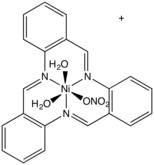2-Aminobenzaldehyde
2-Aminobenzaldehyde is an organic compound with the formula C6H4(NH2)CHO. It is one of three isomers of aminobenzaldehyde. It is a low-melting yellow solid that is soluble in water.
 | |
| Names | |
|---|---|
| Preferred IUPAC name
2-Aminobenzaldehyde | |
| Systematic IUPAC name
2-Aminobenzenecarbaldehyde | |
| Other names
ortho-Aminobenzaldehyde 2-Formylaniline | |
| Identifiers | |
3D model (JSmol) |
|
| ChemSpider | |
| ECHA InfoCard | 100.007.687 |
| EC Number |
|
PubChem CID |
|
CompTox Dashboard (EPA) |
|
| |
| |
| Properties | |
| C7H7NO | |
| Molar mass | 121.139 g·mol−1 |
| Appearance | yellow solid |
| Melting point | 32–34 °C (90–93 °F; 305–307 K) |
| good | |
Except where otherwise noted, data are given for materials in their standard state (at 25 °C [77 °F], 100 kPa). | |
| Infobox references | |
Preparation and reactions
It is usually prepared by reduction of 2-nitrobenzaldehyde with iron[1] or iron(II) sulfate.[2] Like related aminoaldehydes, it is unstable with respect to self-condensation.
2-Aminobenzaldehyde is used to prepare quinolines by the Friedländer synthesis:

The Friedländer synthesis
By template reactions, it also forms trimeric and tetrameric condensation products that have been studied as ligands.

Structure of nickel-aquo nitrate complex of the ligand derived from condensation of three equivalents of 2-aminobenzaldehyde.[3]
gollark: That isn't very much iron or anything
gollark: At $50€ per car no sellers want to sell any cars so no cars are sold.
gollark: The quantity is the total amount sold and the price is the unit price. I don't see the problem.
gollark: ???
gollark: That isn't what that means. At $50, nobody is willing to sell their car.
References
- Chen Zhang; Chandra Kanta De; Daniel Seidel (2012). "o-Aminobenzaldehyde, Redox-Neutral Aminal Formation and Synthesis of Deoxyvasicinone". Org. Synth. 89: 274. doi:10.15227/orgsyn.089.0274.
- Lee Irvin Smith; J. W. Opie (1948). "o-Aminobenzaldehyde". Org. Synth. 28: 11. doi:10.15227/orgsyn.028.0011.
- Fleischer, E. B.; Klem, E. (1965). "The Structure of a Self-Condensation Product of o-Aminobenzaldehyde in the Presence of Nickel Ions". Inorganic Chemistry. 4: 637–642. doi:10.1021/ic50027a008.
This article is issued from Wikipedia. The text is licensed under Creative Commons - Attribution - Sharealike. Additional terms may apply for the media files.